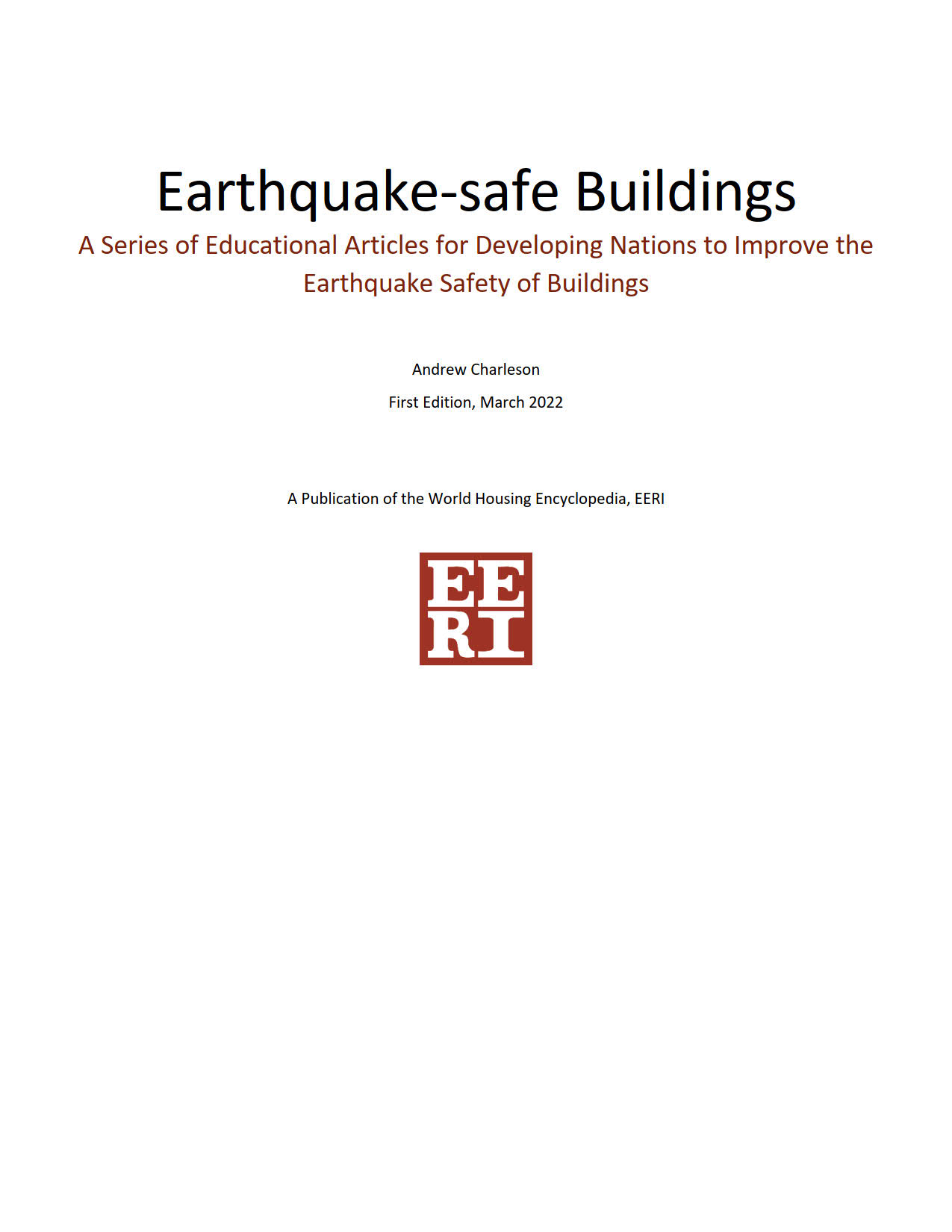| Earthquake-safe Buildings by World Housing Encyclopedia, Earthquake Engineering Research Institute |
| |
Earthquake-safe Buildings is a collection of articles written with a goal to communicate the concepts of  earthquake-resistant design of buildings to the general public. The context of these articles has roots in Indonesia, a country prone to earthquakes and tsunamis. Stakeholders in Indonesia felt that the information on earthquake hazard, effects of earthquakes on buildings and regulations on building safety should be readily available to engineers, architects, contractors, building owners and staff of building departments. The present set of articles is intended to convey the key concepts regarding earthquake safety to a wide range of audiences including professionals and policy-makers. These articles are generally applicable to countries vulnerable to earthquakes and tsunamis. earthquake-resistant design of buildings to the general public. The context of these articles has roots in Indonesia, a country prone to earthquakes and tsunamis. Stakeholders in Indonesia felt that the information on earthquake hazard, effects of earthquakes on buildings and regulations on building safety should be readily available to engineers, architects, contractors, building owners and staff of building departments. The present set of articles is intended to convey the key concepts regarding earthquake safety to a wide range of audiences including professionals and policy-makers. These articles are generally applicable to countries vulnerable to earthquakes and tsunamis.
This document was developed and reviewed by an international team of experts from the World Housing Encyclopedia project. The efforts were led by Andrew Charleson. Comments from the following reviewers helped improve the document: Svetlana Brzev, Marjorie Greene, Shannon Spiers, Dustin Cook, Lars Abrahamczyk and Reza Imani. Brijhette Farmer prepared the drawings. Unless otherwise noted, all photographs were taken by Andrew Charleson. The original set of articles can be downloaded from https://www.world-housing.net/tutorials/earthquake-safe-buildings. The first article has been modified by Manish Kumar to suit the Indian earthquake scenario.
|
| |
| Articles |
| S No |
Subject |
Language |
| Article 1. |
India and Earthquakes |
English/Hindi/Urdu |
| Article 2. |
Avoiding Soil and Foundation Problems during Earthquakes |
English/Hindi/Urdu |
| Article 3. |
Three Structural Systems to Resist Earthquakes |
English/HindiUrdu |
| Article 4. |
Why Walls Are the Best Earthquake-resistant Structural Elements |
English/Hindi/Urdu |
| Article 5. |
Are Walls in Buildings Helpful during Earthquakes? |
English/Hindi/Urdu |
| Article 6. |
How Do Buildings with Reinforced Concrete Columns and Beams Work in Earthquakes? |
English/Hindi/Urdu |
| Article 7. |
Principles for Earthquake-safe Masonry Buildings |
English/Hindi/Urdu |
| Article 8. |
Tying Parts of Buildings Together to Resist Earthquakes |
English/Hindi/Urdu |
| Article 9. |
Local Wisdom and Building Safety in Earthquakes |
English/Hindi/Urdu |
| Article 10. |
Infill Walls and How They Affect Buildings during Earthquakes |
English/Hindi/Urdu |
| Article 11. |
A Common Structural Weakness to Avoid: Soft Story |
English/Hindi/Urdu |
| Article 12. |
A Common Structural Weakness to Avoid: A Discontinuous Wall |
English/Hindi/Urdu |
| Article 13. |
A Common Structural Weakness to Avoid: Short Column |
English/Hindi/Urdu |
| Article 14. |
Preventing a Building from Twisting during Earthquake |
English/Hindi/Urdu |
| Article 15. |
Why Buildings Pound Each Other during Earthquakes |
English/Hindi/Urdu |
| Article 16. |
Construction Codes and Standards |
English/Hindi/Urdu |
| Article 17. |
What to Look for in Building Regulations |
English/Hindi/Urdu |
| Article 18. |
What to Expect from a Building Designed according to Codes |
English/Hindi/Urdu |
| Article 19. |
Importance of Checks during the Design of Buildings |
English/Hindi/Urdu |
| Article 20. |
Importance of Checks during the Construction of Buildings |
English/Hindi/Urdu |
| Article 21. |
Preventing Damage to Non-structural Components |
English/Hindi/Urdu |
| Article 22. |
Retrofitting Buildings against Earthquake |
English/Hindi/Urdu |
| Article 23. |
Advanced Earthquake-Resilient Approaches for Buildings |
English/Hindi/Urdu |
| Article 24. |
Urban Planning and Earthquake Safety |
English/Hindi/Urdu |
| Article 25. |
Tsunamis and Buildings |
English/Hindi/Urdu |
| All Articles |
Earthquake-safe Buildings |
English/Hindi/Urdu |